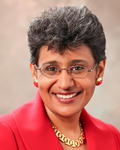11 Dec Shave Margins During Breast Cancer Surgery Reduces Overall Costs

Dr. Chagpar
MedicalResearch.com Interview with:
Anees B. Chagpar, MD, MSc, MPH, MA, MBA, FRCS(C), FACS
Associate Professor, Department of Surgery
Director, The Breast Center
Smilow Cancer Hospital at Yale-New Haven
Assistant Director — Global Oncology
Yale Comprehensive Cancer Center
Yale University School of Medicine
Medical Research: What is the background for this study?
Dr. Chagpar: Up to 40% of women undergoing breast conserving surgery for breast cancer will have to return to the operating room due to positive margins (or cancer cells being found at the edge of what was removed at the initial surgery). We recently reported the results of a randomized controlled trial, published in the New England Journal of Medicine, in which we found that taking a little more tissue circumferentially around the cavity (called shave margins) at the time of the initial surgery could cut the need for re-excisions (or return trips to the operating room) in half. In this analysis, we evaluate the implications of this technique on costs.
Medical Research: What are the main findings?
Dr. Chagpar: We found that taking additional tissue added 10 minutes to the initial operative time. While taking cavity shave margins resulted in higher costs associated with the initial surgery due to increased OR time and additional tissue requiring pathologic evaluation, this is offset by the significant reduction in the need for re-excisions. From a payer perspective, costs including facility and provider fees for the index surgery as well as any breast surgery care in the ensuing 90 days was roughly $750 less for patients who had shave margins taken than for those who did not, although this did not reach statistical significance.
Medical Research: What should clinicians and patients take away from your report?
Dr. Chagpar: At a time when healthcare costs are rising, and patients are facing significant financial toxicity, it behooves us to evaluate the cost implications of our therapies. The technique of taking cavity shave margins takes 10 minutes in the OR, requires no fancy equipment, and can significantly reduce the need for re-excisions at no added cost. As such, there is a value-add for our patients associated with this technique.
Medical Research: What recommendations do you have for future research as a result of this study
Dr. Chagpar: We are embarking on a multicenter trial to validate the Yale findings in a number of centers from a diverse array of practice settings in the United States. If re-excision rates are similarly reduced across settings, these findings may have significant implications for breast cancer surgery nationwide.
Citation:
2015 SABCS San Antonio AACR sponsored conference
Impact of routine cavity shave margins on time and money: Results from the SHAVE trial
[wysija_form id=”5″]
Dr. Anees Chagpar (2015). Shave Margins During Breast Cancer Surgery Reduces Overall Costs MedicalResearch.com
Last Updated on December 11, 2015 by Marie Benz MD FAAD
